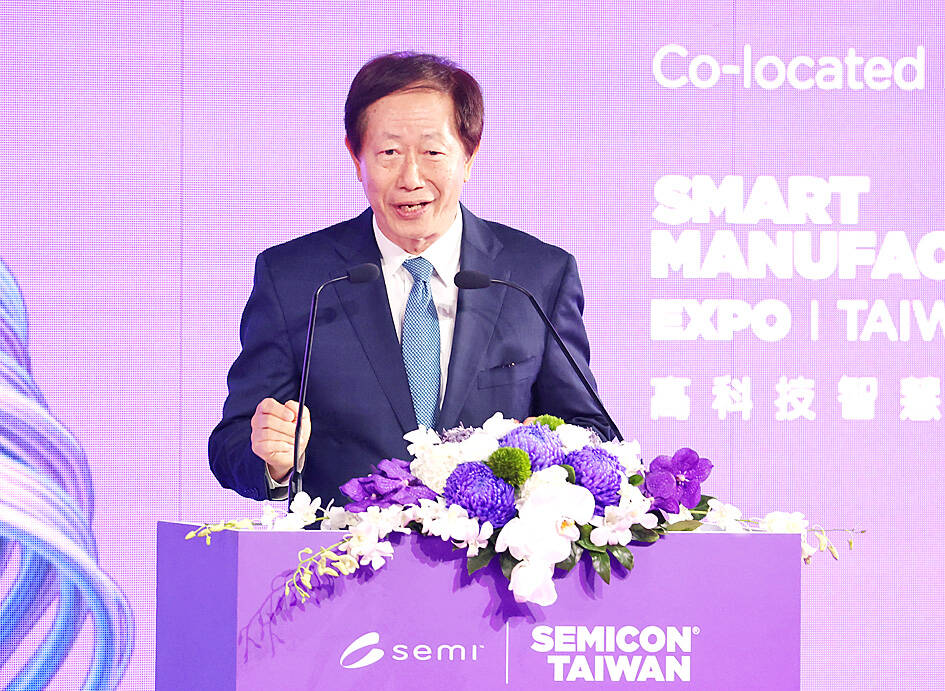Taiwan Semiconductor Manufacturing Co (TSMC, 台積電) is to decide this week whether to invest in Arm Holdings Ltd, which plays a vital role in the semiconductor ecosystem, the company said yesterday.
Arm’s customers, including Apple Inc, Nvidia Corp, Alphabet Inc and Advanced Micro Devices Inc have agreed to back the UK-based chip designer’s US$55 billion initial public offering (IPO) in the US. Intel Corp has also agreed to be a cornerstone investor in the offering.
“We’re going to make a decision this week about Arm,” TSMC chairman Mark Liu (劉德音) told reporters on the sidelines of the Semicon Taiwan trade show in Taipei. “Arm is an important element of our ecosystem, our technology and our customers’ ecosystem.”

Photo: CNA
“We want it to be successful. We want it to be healthy,” Liu said, without disclosing the firm’s potential investment amount.
Asked about TSMC’s planned fab in Germany, Liu said the chipmaker has formed a consortium with three partners to build a 12-inch factory in Dresden, which would focus on automotive chips.
It is in the process of applying for government subsidies, Liu said.
“We are in the process of getting through the German government and the EU support. I think it will soon come up,” Liu said.
The consortium, European Semiconductor Manufacturing Co (ESMC) GmbH, is to be 70 percent owned by TSMC, while customers Robert Bosch GmbH, Infineon Technologies AG and NXP Semiconductors NV would each hold 10 percent.
Liu said he was not concerned about a labor shortage in Germany, or other sites around the world.
In the US, the local government and community have shown their support and are assisting TSMC in resolving issues associated with the factory construction in Arizona, he said.
“Arizona is the first test in our overseas development,” Liu said, adding: “It is a learning process.”
Having visited the Arizona site last month, Liu said: “In the past five months the improvement has been tremendous. I’m sure it will be a very successful project.”
Asked about the tight supply of its chip-on-wafer-on-substrate, or CoWoS, packaging technology, Liu said the company had spent 15 years developing the advanced chip packaging technology and is unable to fully meet customers’ orders because demand suddenly jumped threefold.
The company currently fills about 80 percent of orders, but should be able to catch up with the demand within one-and-a-half years, he said.
Asked about new technologies, Liu said the chipmaker is developing its own silicon photonics technology, the next-generation chip packaging technology dubbed compact universal photonic engine (COUPE), to cope with robust demand for artificial-intelligence (AI) applications such as servers.
COUPE would be a crucial chip technology, Liu said, adding that he expects the silicon photonics market to expand at an annual compound growth rate of 25.7 percent to US$78.6 billion in 2030 from US$12.6 billion last year.

Shiina Ito has had fewer Chinese customers at her Tokyo jewelry shop since Beijing issued a travel warning in the wake of a diplomatic spat, but she said she was not concerned. A souring of Tokyo-Beijing relations this month, following remarks by Japanese Prime Minister Sanae Takaichi about Taiwan, has fueled concerns about the impact on the ritzy boutiques, noodle joints and hotels where holidaymakers spend their cash. However, businesses in Tokyo largely shrugged off any anxiety. “Since there are fewer Chinese customers, it’s become a bit easier for Japanese shoppers to visit, so our sales haven’t really dropped,” Ito

The number of Taiwanese working in the US rose to a record high of 137,000 last year, driven largely by Taiwan Semiconductor Manufacturing Co’s (TSMC, 台積電) rapid overseas expansion, according to government data released yesterday. A total of 666,000 Taiwanese nationals were employed abroad last year, an increase of 45,000 from 2023 and the highest level since the COVID-19 pandemic, data from the Directorate-General of Budget, Accounting and Statistics (DGBAS) showed. Overseas employment had steadily increased between 2009 and 2019, peaking at 739,000, before plunging to 319,000 in 2021 amid US-China trade tensions, global supply chain shifts, reshoring by Taiwanese companies and

Taiwan Semiconductor Manufacturing Co (TSMC) Chairman C.C. Wei (魏哲家) and the company’s former chairman, Mark Liu (劉德音), both received the Robert N. Noyce Award -- the semiconductor industry’s highest honor -- in San Jose, California, on Thursday (local time). Speaking at the award event, Liu, who retired last year, expressed gratitude to his wife, his dissertation advisor at the University of California, Berkeley, his supervisors at AT&T Bell Laboratories -- where he worked on optical fiber communication systems before joining TSMC, TSMC partners, and industry colleagues. Liu said that working alongside TSMC

TECHNOLOGY DAY: The Taiwanese firm is also setting up a joint venture with Alphabet Inc on robots and plans to establish a firm in Japan to produce Model A EVs Manufacturing giant Hon Hai Precision Industry Co (鴻海精密) yesterday announced a collaboration with ChatGPT developer OpenAI to build next-generation artificial intelligence (AI) infrastructure and strengthen its local supply chain in the US to accelerate the deployment of advanced AI systems. Building such an infrastructure in the US is crucial for strengthening local supply chains and supporting the US in maintaining its leading position in the AI domain, Hon Hai said in a statement. Through the collaboration, OpenAI would share its insights into emerging hardware needs in the AI industry with Hon Hai to support the company’s design and development work, as well